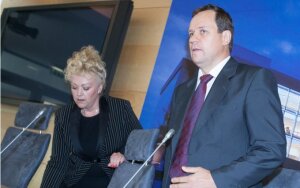- September 6, 2012
- 253
Haszczyński: Polish 5 percent and Moscow in the background

The Polish party does its best to cross the election threshold in the elections to the Lithuanian parlament for the first time.
In the previous elections the success was within their reach, some people already started to celebrate but in the end it turned out that they missed the required 5 percent threshold by 0.21 points. In October the Electoral Action of Poles in Lithuania guided by Waldemar Tomaszewski will go through a tough trial. If it crosses the threshold and gets ten or more seats ( out of 141), it will become a serious player on the political scene and may get an invitation to co-rule the country, even though nobody is really looking forward to it for the time being.
It would be beneficial for the locked in their own Vilnius-world Polish minority as well as for the Lithuanian majority which distrusts Poles and, judging by legislative action taken by elected politicians, has an aversion to them. For the time being Poles have had a few (recently 3) parliamentary representatives elected in single-member constituencies and could count at best on single deputy ministers’ positions without any real impact on the issues important to the Polish minority – from educational system to return of the land.
AWPL has Polishness in its name but has already learnt that the Polish electorate alone is not enough to cross the threshold. That is why a few years ago Tomaszewski entered into agreements with Lithuanian Russian Union – the party of the second largest minority in Lithuania and put on electoral rolls representatives of other, not so numerous minorities like Belorussians and Tatars.
It was not enough to enter the parliament, in addition to this it quickly turned out that the Lithuanian Russian Union cannot always be trusted – after the local elections in Vilnius its representatives left AWPL. What is more, their fraternizing with Russians has allowed Tomaszewski’s opponents (he has quite a few of them) to define his party as pro-Moscow. Russians, pro-Moscow politicians or former KGB-officers can be found also in Lithuanian parties, which does not bother anyone, Polish parties are unfortunately not that privileged.
Its pro-Russianess may be held against AWPL with even greater force now since it put the politicians from Lithuanian Peasants Party on its electoral rolls last week. This party can be also defined as pro-Russian because it is the only political party in Lithuania that has an agreement with United Russia. Its leader is the former prime minister Kazimiera Prunskienė known for her pro-Russian statements who was accused of collaborating with KGB in the past ( the court found her innocent).
Prunskienė herself is seriosly ill, it is her son that is going to stand for election from the AWPL’ roll. It is a small party and cannot even dream about the popularity Prunskienė once enjoyed (in 2004 she reached the second round of presidential elections). But in the battle for crossing the threshold even a few thousand votes may count. AWPL has a chance to play in the first league. It may be lonely out there just as FK Polonija Vilnius in the football league.
Source: http://pl.delfi.lt/opinie/opinie/haszczynski-polskie-5-procent-i-moskwa-w-tle.d?id=59455671
Tłumaczenie Milena Jajkowska w ramach praktyk w Europejskiej Fundacji Praw Człowieka, www.efhr.eu. Translated by Milena Jajkowska within the framework of a traineeship programme of the European Foundation of Human Rights, www.efhr.eu.

